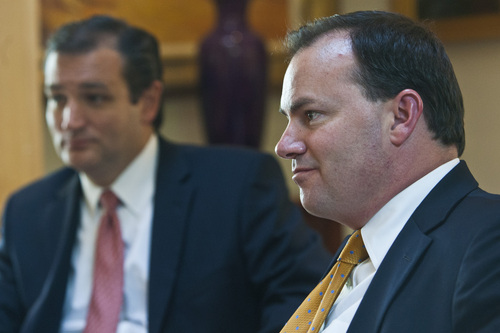This is an archived article that was published on sltrib.com in 2013, and information in the article may be outdated. It is provided only for personal research purposes and may not be reprinted.
More than half of Utah voters now disapprove of the performance of Utah Sen. Mike Lee, with support for the junior senator dropping significantly in recent months, a new poll shows.
The survey also finds that 57 percent of Utahns want Lee, whose crusade against funding Obamacare helped bring about a budget impasse and the shutdown of the federal government, to be more conciliatory and compromise on a budget, even if it means funding President Barack Obama's signature health care law.
"I think it is pressure" to make a deal, said Quin Monson, director of the Center For the Study of Elections and Democracy at Brigham Young University, which conducted the poll.
Lee, however, was steadfast in his position.
"The only numbers I'm concerned with are the percentage of Utahns who are feeling the negative effects of Obamacare through lost jobs, wages, hours and health care," the senator said in a statement.
The poll found 57 percent of all voters want to see Lee be more willing to compromise in the ongoing budget standoff.
Lee has strong support — 90 percent — from those who identify themselves as active in the tea party, but among independents, moderate Republicans and Democrats, there is widespread opposition to Lee's position, with nearly three-fourths wanting to see the senator more willing to compromise.
Monson said that desire for compromise has also been reflected in Lee's approval rating.
In June, Lee's favorability rating stood at 50 percent. In the latest poll, which wrapped up over the weekend, just 40 percent of voters had a favorable impression of Lee. His unfavorable rating was 51 percent in the most recent poll.
Even among Republicans, Lee's favorability dropped from 71 percent to 57 percent.
By contrast, Gov. Gary Herbert enjoyed a 71 percent favorability rating among all voters surveyed and 58 percent had a favorable impression of U.S. Rep. Jim Matheson. Lee's Senate colleague, Orrin Hatch, also was fairly unpopular, with just 44 percent having a favorable impression of the recently elected senior senator.
Monson said the numbers show Lee is in some jeopardy should he, as anticipated, seek re-election in 2016.
"I think it'd be very difficult to predict the outcome of a Republican primary if he was faced with a capable and visible moderate-to-conservative Republican," Monson said. And a Democrat, like Matheson, who can win Republican votes in a general election could also pose a serious threat.
"If there's someone who should really make Senator Lee nervous it's Representative Matheson."
Former Utah Republican Party Chairman Thomas Wright has said he is considering a possible run against Lee.
Complicating the calculus, Monson said, is the Count My Vote initiative effort, which seeks to replace the state's system of nominating candidates with direct primaries.
The current system, where delegates chosen at neighborhood meetings play a key role in nominating candidates, serves Lee well because it favors conservative Republicans. In a direct primary, Lee could have his hands full.
The poll of 938 voters was conducted online between Oct. 2 and Oct. 7.
It has a margin of error of 3.2 percent.
Twitter: @RobertGehrke —
Attorney General John Swallow — voters want him to say goodbye
Attorney General John Swallow got good news form the U.S. Department of Justice last month when he was notified prosecutors would not file criminal charges against him, but voters still want to see Swallow gone.
Seventy-one percent of those surveyed last week said Swallow should resign, down from 78 percent who wanted him to leave in a June poll by the Center for the Study of Elections and Democracy at Brigham Young University.
Voters' opinion of the attorney general has improved just slightly. Twenty-six percent now believe Swallow broke the law, down from 34 percent; 66 percent say he acted unethically, but not illegally, up from 62 percent in June.
Eighty-five percent of voters say they want the House to continue its investigation into the allegations of misconduct against Swallow.
"I think the results of the past few weeks and months have been a bit of a softening on what people think he's actually done but not a big change on what people want to happen," said CSED director Quin Monson.
The good news for Swallow, Monson said, is that when voters are reminded that the Justice Department declined to press charges, support for the House investigation drops by more than 20 percent, although a majority still favor it continuing.



